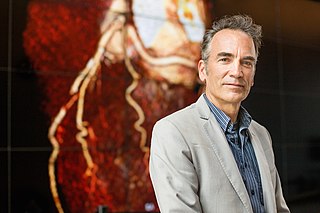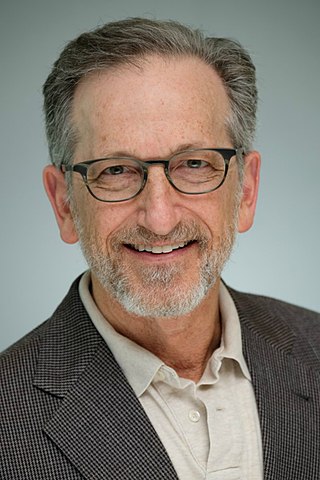
Health informatics combines communications, information technology (IT), and health care to enhance patient care and is at the forefront of the medical technological revolution. It can be viewed as a branch of engineering and applied science.

Renato Marcos Endrizzi Sabbatini is a retired professor at the Department of Biomedical Engineering and at the State University of Campinas Institute of Biology. He received a B.Sc. in Biomedical Sciences from Medical School of the University of São Paulo and a doctorate in behavioral neuroscience in 1977, followed by postdoctoral work at the Max Planck Institute of Psychiatry's Primate Behavior Department. He founded the Center for Biomedical Informatics, and helped create the Brazilian Society for Health Informatics.

The University of California, San Diego School of Medicine is the graduate medical school of the University of California, San Diego, a public land-grant research university in La Jolla, California. It was the third medical school in the University of California system, after those established at UCSF and UCLA, and is the only medical school in the San Diego metropolitan area. It is closely affiliated with the medical centers that are part of UC San Diego Health.
Edward ("Ted") Hance Shortliffe is a Canadian-born American biomedical informatician, physician, and computer scientist. Shortliffe is a pioneer in the use of artificial intelligence in medicine. He was the principal developer of the clinical expert system MYCIN, one of the first rule-based artificial intelligence expert systems, which obtained clinical data interactively from a physician user and was used to diagnose and recommend treatment for severe infections. While never used in practice, its performance was shown to be comparable to and sometimes more accurate than that of Stanford infectious disease faculty. This spurred the development of a wide range of activity in the development of rule-based expert systems, knowledge representation, belief nets and other areas, and its design greatly influenced the subsequent development of computing in medicine.
Vimla Lodhia Patel is a Fijian-born Canadian cognitive psychologist and biomedical informaticist.

Atul Janardhan Butte or Atul J. Butte is an American biomedical informatician, pediatrician, and biotechnology entrepreneur. He is currently the Priscilla Chan and Mark Zuckerberg Distinguished Professor at the University of California, San Francisco. Since April 2015, Butte has serves as inaugural director of UCSF's Bakar Computational Health Sciences Institute.
Translational bioinformatics (TBI) is a field that emerged in the 2010s to study health informatics, focused on the convergence of molecular bioinformatics, biostatistics, statistical genetics and clinical informatics. Its focus is on applying informatics methodology to the increasing amount of biomedical and genomic data to formulate knowledge and medical tools, which can be utilized by scientists, clinicians, and patients. Furthermore, it involves applying biomedical research to improve human health through the use of computer-based information system. TBI employs data mining and analyzing biomedical informatics in order to generate clinical knowledge for application. Clinical knowledge includes finding similarities in patient populations, interpreting biological information to suggest therapy treatments and predict health outcomes.

Christopher G. Chute is a Bloomberg Distinguished Professor at Johns Hopkins University, physician-scientist and biomedical informatician known for biomedical terminologies and health information technology (IT) standards. He chairs the World Health Organization Revision Steering Group for the revision of the International Classification of Diseases (ICD-11).

David Bates is an American physician, biomedical informatician, and professor, known for his work regarding the use of health information technology (HIT) to improve the safety and quality of healthcare, in particular by using clinical decision support. Bates has done work in the area of medication safety. He began by describing the epidemiology of harm caused by medications, first in hospitalized patients and then in other settings such as the home and nursing homes.

Elliot R. McVeigh is a professor of bioengineering, Medicine and Radiology at the University of California, San Diego (UCSD). His research utilises low dose CT imaging and MR imaging techniques to identify those people at substantially higher risk for heart attacks.
John W. Ayers is an adjunct associate professor and epidemiologist at University of California, San Diego, affiliated both with the university's School of Medicine and its Qualcomm Institute. He researches in the field of public health informatics and the use of social media data in detecting behavioral health trends. His public health research expertise is in studying the circulation of information online. Trained in both political science and data science, he has published in medical journals including Journal of the American Medical Association, JAMA Internal Medicine, American Journal of Public Health, and American Journal of Preventive Medicine. His research findings have been featured in national and international media sources, including The New York Times, The Washington Post, Los Angeles Times, Time, and Newsweek.

Gary S. Firestein is an American rheumatologist, professor, and founding director of the Altman Clinical and Translational Research Institute (ACTRI) at the University of California San Diego and Senior Associate Vice Chancellor for Health Sciences at University of California, San Diego.
JoAnn Trejo is an American pharmacologist, cell biologist, a professor, and also an assistant vice chancellor in the department of health sciences faculty affairs in the Department of Pharmacology at the School of Medicine at University of California, San Diego. She is also the assistant vice chancellor for Health Sciences Faculty Affairs. Trejo studies cell signalling by protease-activated G protein-coupled receptors (GPCRs). She is also actively involved in mentoring, education and outreach activities to increase the diversity of science.

Julia Rose Adler-Milstein is an American health informatician and policy expert in health IT infrastructure. She is a Professor of Medicine and Director of the Center for Clinical Informatics and Improvement Research at the University of California, San Francisco. In 2019, she was named a Member of the National Academy of Medicine.
Wendy Webber Chapman is an American research scientist in biomedical Natural language processing and Information Extraction. In 2019, after serving for six years as Chair of the University of Utah School of Medicine Division of Biomedical Informatics, Chapman left the institution to join the University of Melbourne.
Teri E. Klein is an American professor of Biomedical Data Science and Medicine at Stanford University. She is known for her work on pharmacogenomics and computational biology.
Daniel Richard Masys is an American biotechnologist and academic. He is an Affiliate Professor of Biomedical and Health Informatics at the University of Washington.
Suzanne B. Bakken Henry is an American nurse who is a professor of biomedical informatics at Columbia University. Her research considers health equity and informatics. She is a Fellow of the New York Academy of Medicine, American College of Medical Informatics and American Academy of Nursing.
Robert A. Greenes is a pioneer in the field of biomedical informatics (BMI). His work has focused on knowledge representation, decision support, and human-computer interaction for health and healthcare. He was co-developer of the MUMPS System and Language in the 1960s. He is an Emeritus Professor of Biomedical Informatics at Arizona State University.

Nigam Shah is a scientist, educator, and entrepreneur. His research is focused on the application of machine learning, knowledge representation, and artificial intelligence for the analysis of multiple types of health data. He is a professor of Medicine and Biomedical Data Science at Stanford University and the Chief Data Scientist at Stanford Health Care.










